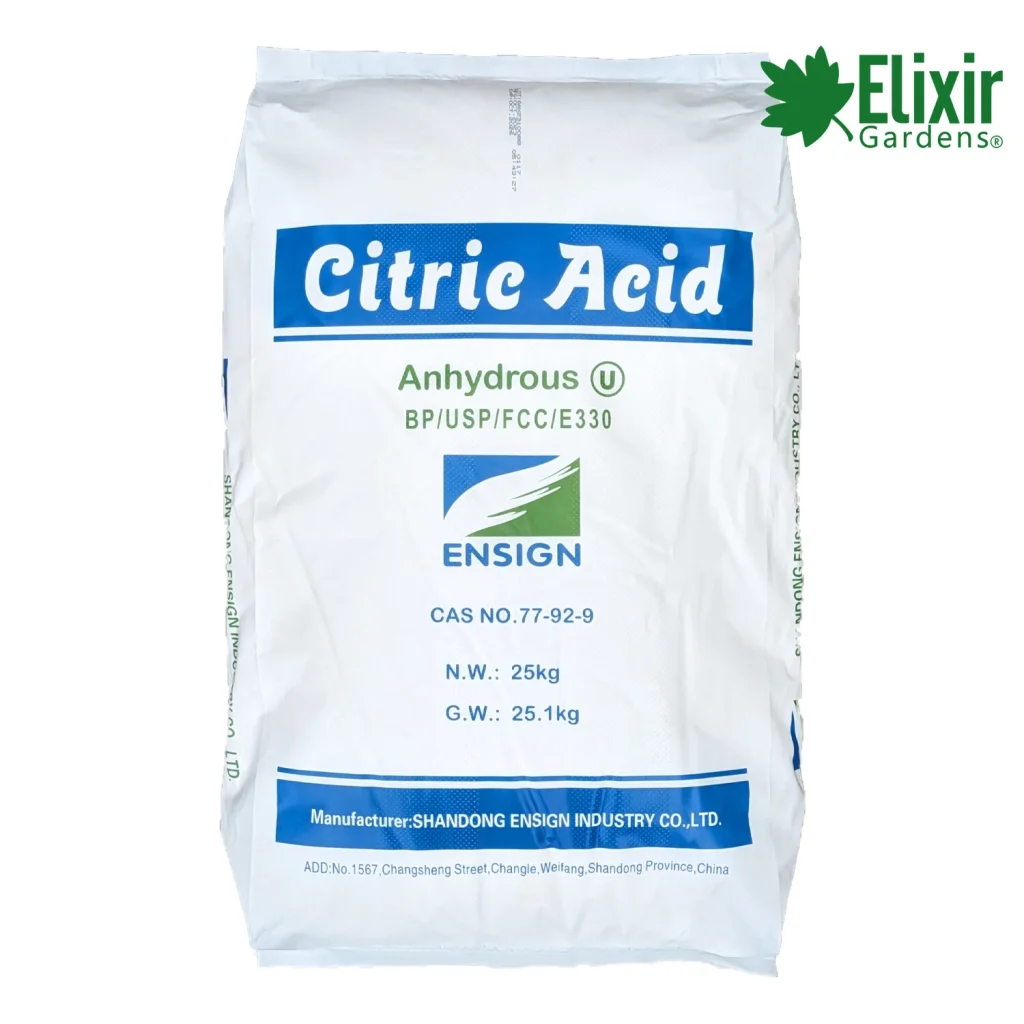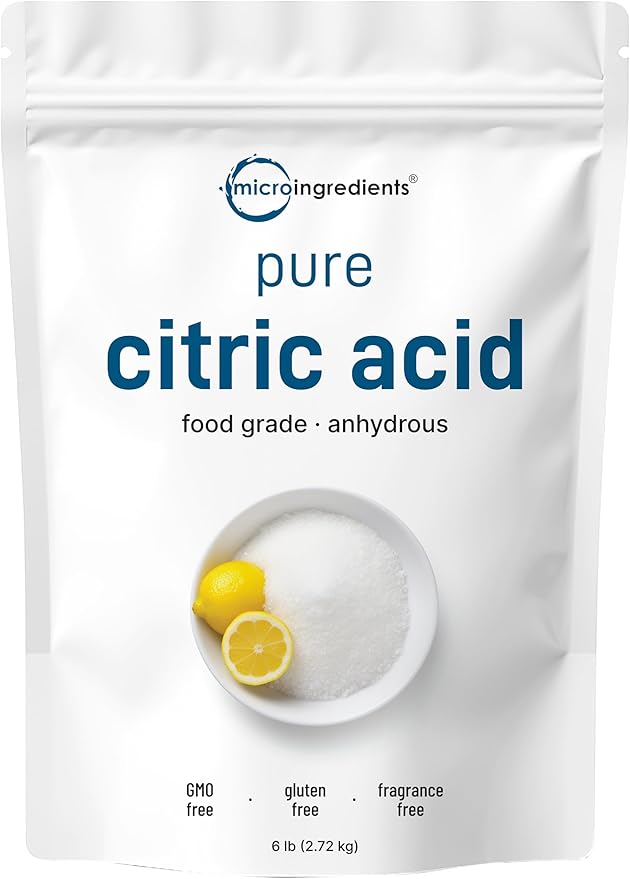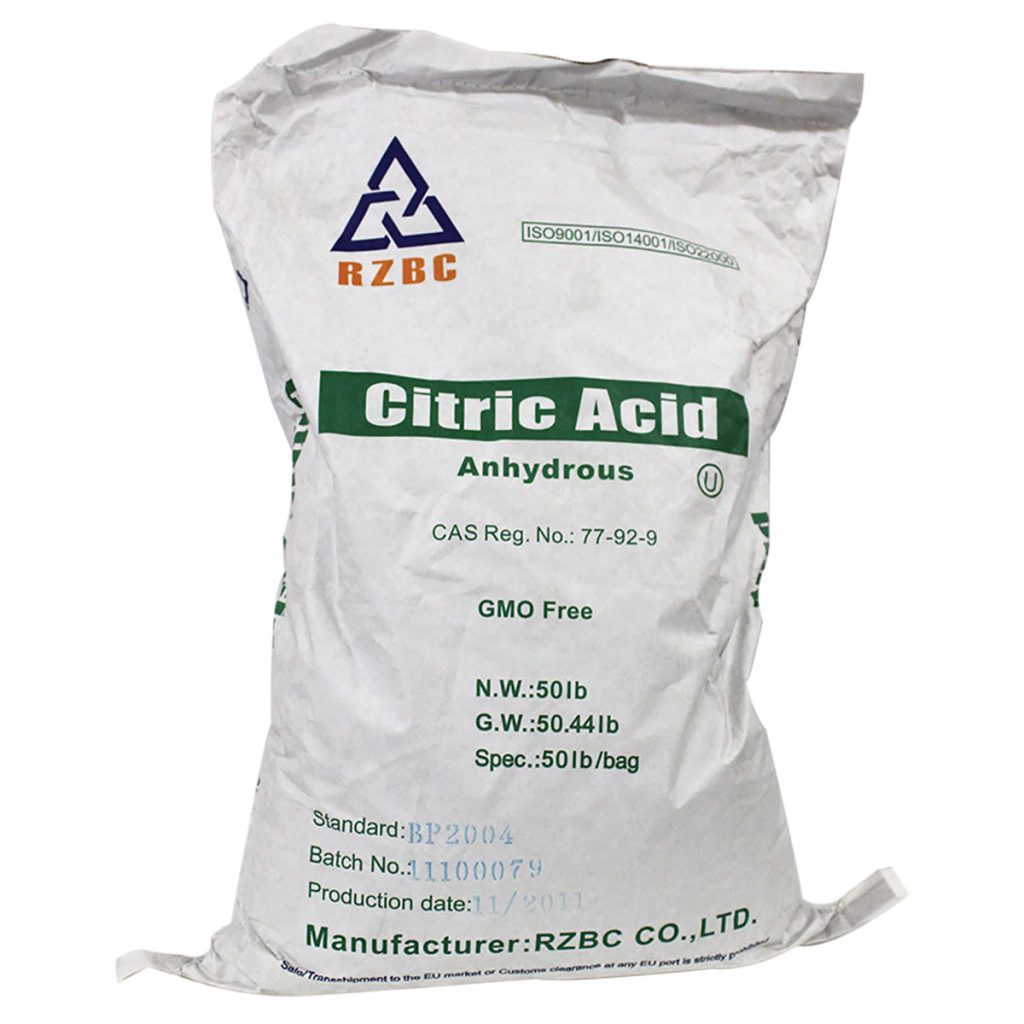What’s Citric Acid ?
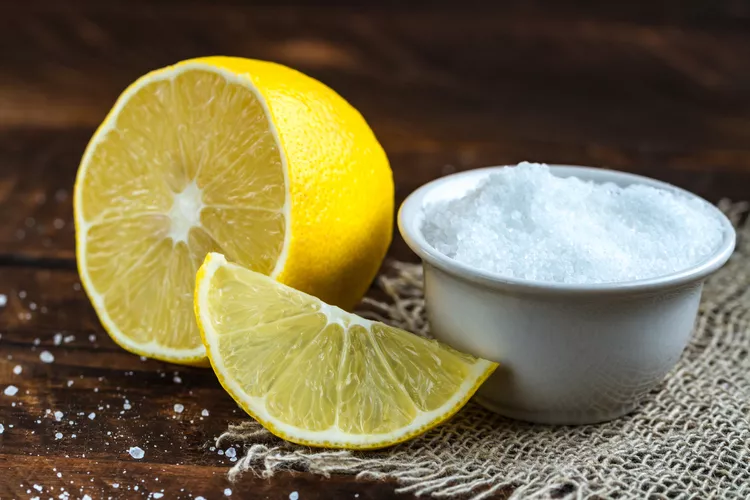
Citric acid is a weak organic acid commonly used in the food, cosmetic and pharmaceutical industry. The parent base of citric acid, citrate, is a component of the Krebs cycle, and occurs naturally during metabolism in all living organisms. It is found naturally in citrus fruit such as lemons and limes and is used as a natural preservative. It has had the water molecules removed and is usually in a dry, powdered formulation.
It is often used to adjust pH, to add sour flavor to foods and beverages, and to form the salt derivative of minerals and metals for pharmaceuticals, as in the case of potassium citrate, a dietary supplement. According to the FDA Select Committee on Generally Recognized as Safe (GRAS) food substances, citrate salts, including citric acid, are generally regarded as safe when used in normal quantities.
It is an ingredient used in food, beverage, and pharmaceutical industries. It brings a clean, refreshing tartness to any product it is added to. It is primarily an acidulant but can also be used as a sequestrant of metal ions to protect from the development of off-flavors and off-odors in certain foods. Its major use is in the manufacturing of ecologically compatible detergents.
It acts as an antioxidant, meaning it protects the body from damaging free radicals. Eating ample antioxidants helps with everything from heart health to cancer prevention.
Usage
It is a versatile compound used as a food additive, cleaning agent, and in pharmaceuticals and cosmetics. It acts as a preservative, flavor enhancer, and pH regulator in food and beverages. In cleaning, it’s a natural descaler and stain remover. It also finds use in pharmaceuticals and cosmetics for various applications like pH adjustment and as an excipient.
Food Industry:
- Preservative: It helps extend the shelf life of food products by inhibiting microbial growth and preventing oxidation.
- Flavor Enhancer: It adds a tart, sour taste to beverages, candies, and other foods, enhancing their overall flavor profile.
- pH Adjuster: It helps control the acidity of food products, ensuring stability and consistency.
- Chelating Agent: It binds with metal ions, preventing them from affecting the taste or appearance of food.
Cleaning and Household:
- Descaling Agent:Citric acid anhydrous effectively removes limescale and mineral deposits from appliances like coffee makers and kettles.
- Stain Remover:It can be used to remove hard water stains, rust, and other types of stains from various surfaces.
- Natural Cleaning Product:It’s a key ingredient in many eco-friendly cleaning products due to its ability to dissolve mineral deposits and stains.
Pharmaceuticals and Cosmetics:
- pH Adjuster:Citric acid anhydrous helps regulate the pH of cosmetic and pharmaceutical formulations.
- Excipient:It acts as a binder and filler in tablets and capsules, aiding in their formulation and dissolution.
- Chelating Agent:In pharmaceuticals, it can be used to bind with metal ions to create medications or supplements.
- Antioxidant:It can be used as an antioxidant in some pharmaceutical and cosmetic products.
Other Uses:
- Water Softener:Citric acid anhydrous can be used to soften water, making it suitable for use in detergents and other applications.
- Industrial Applications:It’s used in various industrial processes, including electroplating and leather tanning.
- Animal Feed:It can be added to animal feed to improve digestion and nutrient utilization.
Is citric acid anhydrous safe to eat?
Yes, citric acid is generally safe to eat. It is a natural organic acid found in citrus fruits like lemons and limes and is commonly used as a food additive for flavoring and as a preservative. The US Food and Drug Administration (FDA) recognizes citric acid as safe when used in food products.
What are the side effects ?
Sometimes, drugs with citric acid can cause severe side effects, such as:
- Confusion.
- Lightheadedness.
- Chest pain.
- Fast heartbeat.
- Pain.
- Tingling or numbness in your hands or feet.
- Fatigue.
Is eating a lot of citric acid bad for you?
Citric acid acts as a preservative and antioxidant, adds acidity, alters the pH, and enhances mineral absorption. Most people can consume and use regular amounts of citric acid safely without concern. People with mold allergies may be allergic to compounds in the synthetic versions of citric acid.
Natural Sources
You can find citric acid naturally in fruit, namely citrus fruits. The juices of these fruits are also sources.
Natural sources include:
- Blackberries
- Grapefruits
- Lemons
- Limes
- Oranges
- Raspberries
- Strawberries
Artificial Sources
Scientists can produce synthetic forms of citric acid. They ferment the fungi Aspergillus niger and the yeast Yarrowia lipolytica.
This is considered a manufactured form of citric acid since it does not occur naturally. You can find synthetic forms of citric acid in food and beverages, supplements and medications, cosmetics, and cleaning products.
Food and Beverages

There are a few reasons why manufacturers add citric acid to food and drinks, such as:
- Acts as a preservative
- Adds an acidic flavor or a brighter color
- Helps control the pH of the product
Increasing the acidity of foods or drinks in this way helps prevent the growth of mold, fungus, mildew, and bacteria. These microbes could cause illness if you ingest them.
Supplements and Medications
Synthetic citric acid enhances the absorption and preserves the vitamins and minerals in supplements. It also enhances the flavor so they are more acidic and palatable.
Citric acid is often used with sodium bicarbonate (baking soda) to create effervescent (fizzy) tablets or powders. Effervescence can make certain compounds taste better, especially when made with citric acid, which gives off a citrus flavor. These fizzy tablets tend to dissolve and work quickly in your body.
Cosmetics
You can find it in many beauty products like shampoo, body soap, face wash, lotion, and conditioner. It helps balance the pH of a product and stabilize it for a longer shelf-life.
It also has antioxidant properties and other properties that support skin health. This makes it a common additive to many skin products.
Cleaning Products
You can find citric acid in several cleaning products like detergents, disinfectants, and sanitizers. It also cleans food equipment to eliminate lingering flavors. The acid helps kill bacteria, mildew, fungi, and some viruses and eliminates dirt, rust, slime, and calcium deposits.
Citric Acid Benefits and Uses
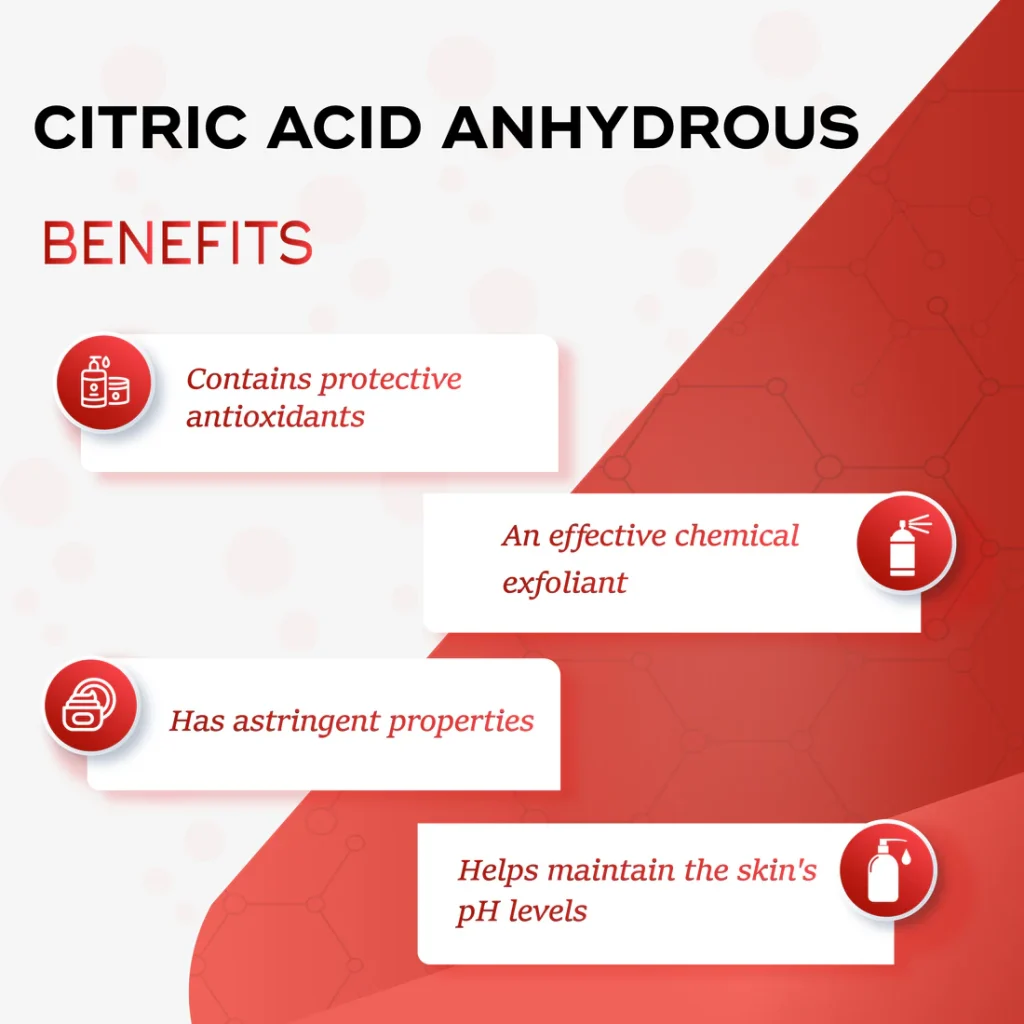
It offers several health benefits, both in its natural and manufactured form. It has antioxidant properties, can increase nutrient absorption, and promotes kidney and skin health.
Acts as an Antioxidant
The natural form of citric acid is an antioxidant. Antioxidants help reduce oxidative damage to cells. This cell damage has been linked to cancer, heart disease, neurological disease, and more. Antioxidants also counter inflammation in a way that supports brain, immune, and liver health.
Enhances Nutrient Absorption
It is added to many mineral supplements to preserve them, balance the pH, and enhance their absorption. A few examples include magnesium citrate, calcium citrate, and potassium citrate.
Calcium citrate is one of the most bioavailable forms of calcium. High bioavailability means your body can absorb it easily. This is helpful for raising levels of calcium, which is a mineral that many people do not get enough of.
Magnesium citrate has been shown to be more effective at raising magnesium levels than magnesium oxide. This form of magnesium is commonly used as a laxative for people with constipation or in preparation for a colonoscopy.
May Prevent Kidney Stones
Increasing urinary citrate levels can prevent kidney stones. You may eat more fruits rich in citric acid and low in oxalates, such as lemons and limes. Taking alkaline-citrate salts like potassium citrate can also help.
The citrate binds with calcium in your urine to prevent oversaturated urine. It can also bind calcium oxalate crystals to prevent them from growing and becoming painful.
Promotes Skin Health
You can find citric acid in skincare products like face wash and body soap. It is a type of alpha-hydroxy acid (AHA) that can counter inflammation and signs of aging. It peels off dead skin cells. This promotes a new generation of skin cells and, in turn, improves skin elasticity.
High doses of or prolonged exposure to citric acid could be harmful. It may cause skin irritation and a greater risk of skin damage from ultraviolet (UV) rays.
Safety and Risks
Citric acid is generally recognized as safe (GRAS) by the Food and Drug Administration (FDA). The amounts used in food and beverages are within safe limits. It’s possible to be allergic to fruits that contain citric acid. Avoid or take precautions when trying natural sources if you have a known allergy.
Synthetic citric acid may also pose an allergen risk to some people. The fungi used to manufacture citric acid could be an allergen. You may be allergic to this compound if you have a mold allergy.
Manufactured forms of citric acid can contribute to long-term, or chronic, inflammation. This can increase the risk of conditions like asthma, irritable bowel syndrome (IBS), and fibromyalgia. It’s unclear whether it has a direct impact on these conditions.
Citric acid could cause irritation depending on how much you use and your skin’s sensitivity to it. Make sure to test new skincare products in small patches before using them fully. Stop using a product if it causes pain or irritation.
A Quick Review
Citric acid is naturally present in citrus and other fruits, like berries. You can also find manufactured forms of citric acid in several foods, pharmaceuticals, personal care items, and cleaning products. Citric acid acts as a preservative and antioxidant, adds acidity, alters the pH, and enhances mineral absorption.
Most people can consume and use regular amounts of citric acid safely without concern. People with mold allergies may be allergic to compounds in the synthetic versions of citric acid.
The main brand in the market
